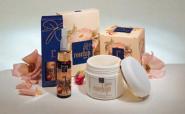
Featured article
The dangerous chemicals in beauty products and how to avoid them

Each day British women reach for shampoo, conditioner, deodorant and moisturiser. We apply nail polish, lipstick and probably also a dab of perfume. We look good, we smell good, but we have just exposed ourselves to over 200 different chemicals and that’s before we even step out of our front doors!
We’re increasingly careful about the content of the food we eat, but when it comes to the chemicals that we daily massage in to our skin, soak up in the bath, scrub our teeth and gums with or the make-up that we apply, we are very trusting.
Although certain chemicals (that have been proven to the harmful to our bodies) have recently been banned from use in cosmetics, there are still some substances that have been linked to health issues and that are still widely used in products. Listed below are some of the main culprits to be avoided wherever possible:
article continued
Advertisement
Preservatives (Parabens).
Methyl, Ethyl, Propyl and Butyl parabens are the most common preservative used in skin care. Parabens have been implicated in a number of disorders such as asthma, eczema and there is a theory that they may also be carcinogenic (cancer-causing) – traces of parabens have been found in cancer tumours. This of course, does not prove that they cause cancer, but it is worrying nevertheless.
Sodium Lauryl sulphates/sodium laureth sulphates
These are foaming agents widely used in shower and bath products and also in some toothpastes. They are synthetic detergents derived from coconut oil, and can cause irritation to the eyes and skin and have been linked to asthma.
Aluminium
Aluminium in its various forms is widely used in lipsticks and deodorants and has been linked to Alzheimers disease. It is used in anti-perspirant deodorants to prevent sweating (it coats the skin, not allowing sweat to escape). Sweating, however, is our natural way of removing toxins from the body. This is the reasoning behind the theory that it could (with long-term use) increase our chances of getting breast cancer. After all, if toxins are not allowed to escape through our sweat glands, where do they go and what damage do they do to our bodies?
We now know that the skin is permeable and literally soaks up a high percentage of whatever we directly apply to it. We also know that these substances absorb into our bloodstreams and eventually end up in the organs and glands of our bodies.
This view led to the development of transdermal patches, which deliver drugs in to the body via the skin e.g. anti-smoking patches.
So what can we do?
With these points in mind would it not be sensible to at least limit the amounts of chemicals we use every day? After all the less we and our families breathe, eat or absorb toxic chemicals, the less chance there is that they will affect us in a negative way.
Simple steps to take to limiting synthetic chemicals in cosmetics:
- Always read the labels! Manufacturers are now obliged by law to list all ingredients used in their products
- Beware of product ranges that claim to be natural, but actually are not. Often they contain a small amount of natural ingredients accompanied by larger quantities of synthetics. This again comes back to reading the labels!
- Choose natural toothpastes – there are several on the market but particularly good is AloeDent toothpaste (available at some chemists and most health food shops) it contains Aloe-Vera and silica – a natural whitener
- Instead of synthetic perfume choose aromatherapy-scented body oils – which moisturise and perfume the body in one go – they tend to be preservative-free
- For the bath and shower again go for aromatherapy bath oils and bath and shower gels that contain palm extract instead of sodium lauryl sulphate. They lather up just as effectively without harmful side effects and irritation to the skin
- Choose aluminium-free deodorants. These products still allow you to sweat so may need to be reapplied throughout the day. Tisserand make a good one with a choice of lavender, tea-tree or lime.
For general skin and body care and cosmetics the following ranges are at least 90% natural and 100% paraben free:
- Living Nature – from New Zealand – this range includes shower, body and face products and a totally natural make-up range (www.livingnature.com)
- Dr Hauschka – from Germany also make body and face products and make-up (www.drhauschka.co.uk)
- Circaroma – a London-based aromatherapy product range for face and body (www.circaroma.com)
- Weleda – again face and body products (www.weleda.co.uk)
Related Articles:
About the Author
Becca Teers is an Holistic & Beauty Therapist with over 12 years experience in the health & beauty field. She is the founder & owner of Therapy, a Beauty & Holistic Therapy Salon in East Dulwich, London.
Becca’s homepage